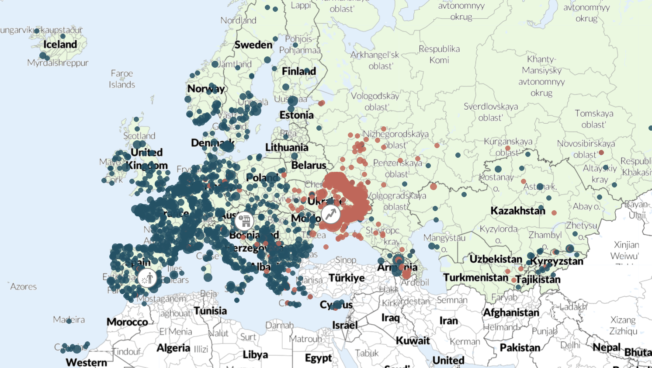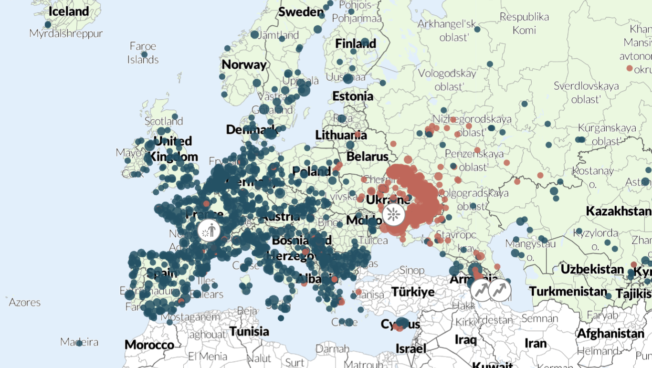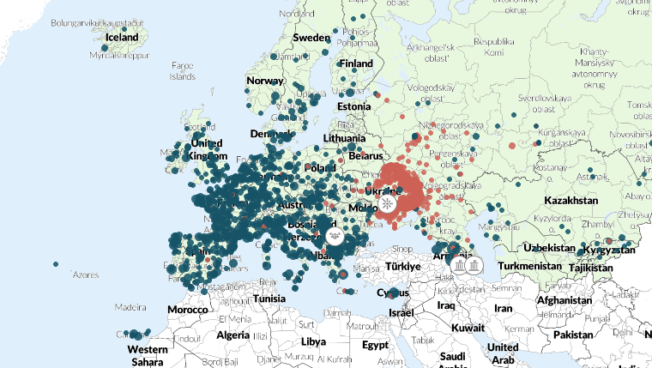Regional Overview
Europe & Central Asia
February 2024
Posted: 7 March 2024
 Armenia-Azerbaijan: Cross-border gunfire resumes
Armenia-Azerbaijan: Cross-border gunfire resumes
Shooting incidents along the border between Armenia and Azerbaijan resumed in February after a three-month lull. On 12 February, the Azerbaijani defense ministry alleged two instances of gunfire from Armenian territory, one of which reportedly wounded an Azerbaijani border guard. On the following day, Azerbaijani gunfire killed four Armenian personnel and wounded one on the southern section of the border in the area of Nerkin Hand, Syunik region. Five further gunfire incidents were reported along the borders throughout the rest of the month. Nevertheless, peace treaty talks between Armenia and Azerbaijan resumed in mid-February with German mediation.1Common Space, ‘Armenian and Azerbaijani foreign ministers meet in Berlin as German diplomacy emerges out of the shadows to save the day for Europe,’ 29 February 2024 Pointing to a probable delaying tactic to extract maximum concessions in an already fraught process,2Thomas de Waal, ‘In the Caucasus, Another Year of War or Peace,’ Carnegie Europe, 13 February 2024 Azerbaijan demanded that Armenia scrap references to Artsakh3The disputed territory of Nagorno-Karabakh is internationally recognized as part of Azerbaijan. ACLED refers to the former de facto state and its defunct institutions in the hitherto ethnic Armenian majority areas of Nagorno-Karabakh as Artsakh — the name by which the de facto territory used to refer to itself. For more on methodology and coding decisions around de facto states, see this methodology primer. from its founding legislation.4President of the Republic of Azerbaijan, ‘Ilham Aliyev received Secretary General of Inter-Parliamentary Union,’ 1 February 2024
 Europe: Farmer protests expand
Europe: Farmer protests expand
After engulfing Germany and then France in January, the wave of farmer protests demanding less regulation and more protection spread across Europe in February. While recording a comparable number of events — almost 1,800 and 1,900 events, respectively — ACLED notes demonstration activity in 27 European countries in February, compared with 17 in January. During demonstrations, farmers dumped manure, burned hay and tires, and blocked roads, borders, and ports. Over a quarter of protests occurred in Spain, where farmers demanded fairer prices for their produce, the same standards for free-trade counterparts, and greater post-drought aid.
More than a fifth of demonstrations occurred in Poland, where farmers have been protesting against competition with Ukrainian agricultural produce since early 2023. In February, they intermittently blocked six of eight land border crossings with Ukraine for cargo trucks, as well as occasionally crossings into the Czech Republic, Germany, and Lithuania. There were also several instances of demonstrators spilling Ukrainian agricultural produce. Ukrainian truck drivers responded with counter-protests on the other side of the border, while the Polish and Ukrainian governments appeared to be talking past each other about ways to resolve the crisis.5Vanessa Gera, ‘Ukraine’s fate hangs in the balance, Polish premier says as he moves to secure aid transit route,’ Associated Press, 22 February 2024 Large farmer rallies also occurred in Greece and Italy, including in the respective capitals.
Most demonstrations proceeded peacefully across the region — with the exception of the Netherlands, where about a third of farmer demonstrations turned violent. Participants blocked highway exits and burned tires and bales of hay, leading to eventual dispersal by police. Notable outbreaks of violence also occurred in France and Belgium. On 23 February, French farmers descended on an agricultural fair in Paris and clashed with police on the following day while attempting to interrupt President Emmanuel Macron’s opening remarks. Two violent demonstrations occurred in Brussels, both targeting European Union institutions during meetings discussing agricultural and environmental policies. Despite the EU scrapping plans to cap pesticide use and shelving a free trade deal with several Latin American countries in the wake of the protests, farmers are seeking to derail parts of the Green Deal that require farmers to cut methane emissions and meet other environmental targets.6Jon Henley and Sam Jones, ‘They’re drowning us in regulations’: how Europe’s furious farmers took on Brussels and won,’ Observer, 10 February 2024
 Russia: Crackdown on Navalny vigils
Russia: Crackdown on Navalny vigils
On 16 February, Russian prison authorities announced the death of detained opposition leader Alexei Navalny. He was serving a lengthy sentence on bogus charges after surviving an assassination attempt by suspected security service operatives.7Andrew Roth, ‘Russian court sentences Alexei Navalny to further 19 years in prison,’ Guardian, 4 August 2023 He died a month before President Vladimir Putin’s expected re-election to a fifth term after nearly 25 years in power. With space for demonstrations severely limited by military censorship and COVID-19 restrictions still in force in Russia, police cracked down on people laying flowers at makeshift memorials that appeared shortly after the announcement. Of the over 440 arrests in connection with the memorials in the first three days after the news broke, around half occurred in St. Petersburg, Putin’s hometown. Police detained at least 65 people in Moscow and the rest in 27 other cities across Russia. The delayed burial of Navalny on 1 March drew crowds but proceeded calmly amid heavy police presence and government intimidation of students on the eve.8BBC, ‘Authorities return body of Alexei Navalny to mother 8 days after death,’ 24 February 2024; Agentstvo, ‘Authorities remind schools that rallies are unacceptable,’ 28 February 2024
Separately, pointing to likely further diminishing tolerance of dissent, Russian courts sentenced Boris Kagarlitsky, a prominent left-wing thinker, and Oleg Orlov, a veteran human rights activist, to prison terms after initially imposing heavy fines on both for criticizing Russia’s ongoing war against Ukraine.9Amnesty International, ‘Russia: Anti-terrorism legislation misused to punish activist Boris Kagarlitsky,’ 13 February 2024, ‘Russia: Oleg Orlov, imprisoned following appeal against sham trial, must be released,’ 27 February 2024
For more, see ACLED’s analysis of protest activity ahead of the March 2024 presidential election in Russia.
 Ukraine: Russian counter-attack presses ahead
Ukraine: Russian counter-attack presses ahead
On 17 February, Ukrainian forces withdrew from Avdiivka, north of the Russian-occupied city of Donetsk, after holding on to the heavily fortified salient for over four months amid a renewed Russian assault. Russian forces overwhelmed defenders with the sheer mass of armor and infantry, high casualties notwithstanding.10Ministry of Defence (UK) X @DefenceHQ, 3 March 2024 Additionally, Russian forces may have achieved localized aerial superiority for the first time since the beginning of the invasion despite higher-than-usual losses of fighter jets.11Grace Mappes et al., ‘Russian Offensive Campaign Assessment,’ Institute for the Study of War, 17 February 2024 As Ukrainian forces retreated, Russian forces also captured several villages north and west of Avdiivka. Fighting continued around Bakhmut in the Donetsk region and near Kupiansk in the Kharkiv region, while in the Zaporizhia region, Russian forces concentrated their attacks on Robotyne and neighboring Verbove.
Although gaining ground at a slower pace than Ukraine during its counter-offensive in the summer and fall of 2023, Russian forces are capitalizing on troop and ammunition advantage12Jack Watling and Nick Reynolds, ‘Russian Military Objectives and Capacity in Ukraine Through 2024,’ Royal United Services Institute,’ 13 February 2024 as Ukraine is grappling with the mobilization bill stalled in parliament13Asami Terajima, ‘Revised mobilization bill seeks to reinforce conscription in Ukraine in 2024,’ Kyiv Independent, 5 February 2024 and uncertainty of further weapon shipments from the United States due to the gridlock in Congress.14Manu Raju, ‘Johnson gives House GOP’s Ukraine backers room to craft plan as pressure builds for floor vote,’ CNN, 3 March 2024 Meanwhile, around the second anniversary of Russia’s invasion, Ukraine signed multi-year military assistance agreements with a raft of signatories of the G7 declaration on continuous support for Ukraine,15G7, ‘Joint declaration of support for Ukraine,’ 12 July 2023 including France and Germany. The United Kingdom signed the first such agreement in January, with a number of other treaties pending.16Tom Balmforth, ‘Explainer: What are the security deals Ukraine is discussing with allies?,’ Reuters, 24 February 2024 Additionally, on 1 February, EU member states overcame Hungary’s opposition to a large budgetary support package for Ukraine.
For more information, see the ACLED Ukraine Conflict Monitor.
See more
See the Codebook and the User Guide for an overview of ACLED’s core methodology. For additional documentation, check the Resource Library. Region-specific methodology briefs can be accessed below.
Links:
For additional resources and in-depth updates on the conflict in Ukraine, check our dedicated Ukraine Crisis Hub.







